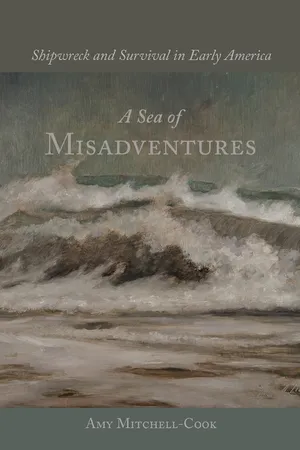
- 240 pages
- English
- ePUB (mobile friendly)
- Available on iOS & Android
About This Book
A Sea of Misadventures examines more than one hundred documented shipwreck narratives from the seventeenth to the nineteenth century as a means to understanding gender, status, and religion in the history of early America. Though it includes all the drama and intrigue afforded by maritime disasters, the book's significance lies in its investigation of how the trauma of shipwreck affected American values and behavior. Through stories of death and devastation, Amy Mitchell-Cook examines issues of hierarchy, race, and gender when the sphere of social action is shrunken to the dimensions of a lifeboat or deserted shore.
Rather than debate the veracity of shipwreck tales, Mitchell-Cook provides a cultural and social analysis that places maritime disasters within the broader context of North American society. She answers questions that include who survived and why, how did gender or status affect survival rates, and how did survivors relate their stories to interested but unaffected audiences?
Mitchell-Cook observes that, in creating a sense of order out of chaotic events, the narratives reassured audiences that anarchy did not rule the waves, even when desperate survivors resorted to cannibalism. Some of the accounts she studies are legal documents required by insurance companies, while others have been a form of prescriptive literature—guides that taught survivors how to act and be remembered with honor. In essence, shipwreck revealed some of the traits that defined what it meant to be Anglo-American. In an elaboration of some of the themes, Mitchell-Cook compares American narratives with Portuguese narratives to reveal the power of divergent cultural norms to shape so basic an event as a shipwreck.
Frequently asked questions
Information
Table of contents
- Cover
- Half title
- Title
- Copyright
- Contents
- List of Illustrations
- Preface
- Acknowledgments
- Prologue
- 1 Fact or Fiction? The Publication of American Shipwreck Narratives
- 2 The Legalities of Loss, Wreck, and Ruin
- 3 God, Nature, and the Role of Religion in Shipwreck
- 4 They Worked Like Horses but Behaved Like Men
- 5 To Honor Their Worth, Beauty, and Accomplishments
- 6 Chaos and Cannibalism on the High Seas
- 7 Portuguese Narratives: A Comparative Perspective
- Epilogue
- Notes
- Bibliography
- Index